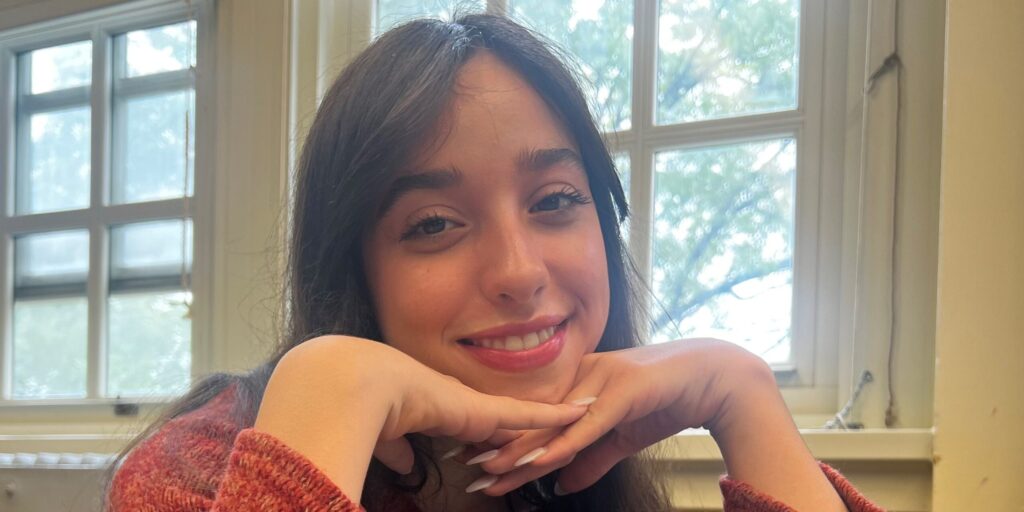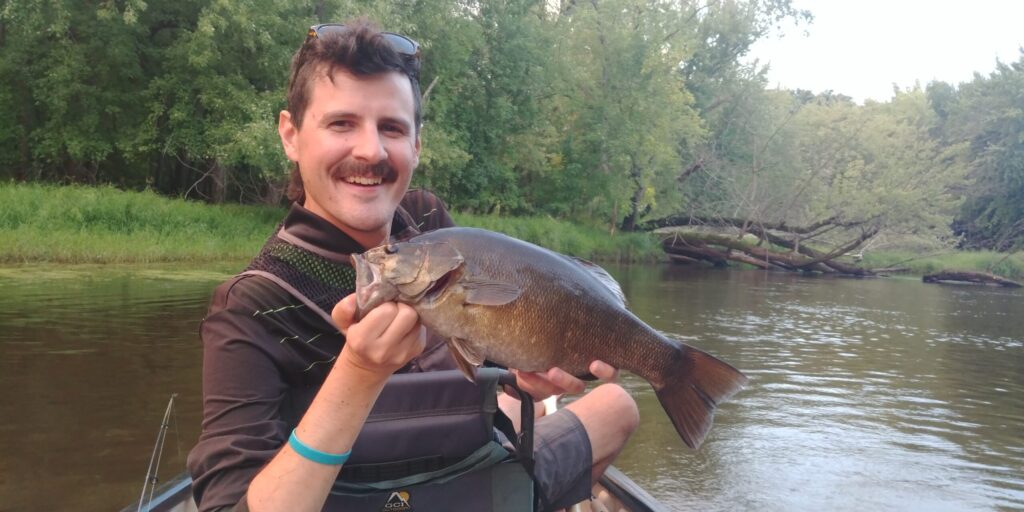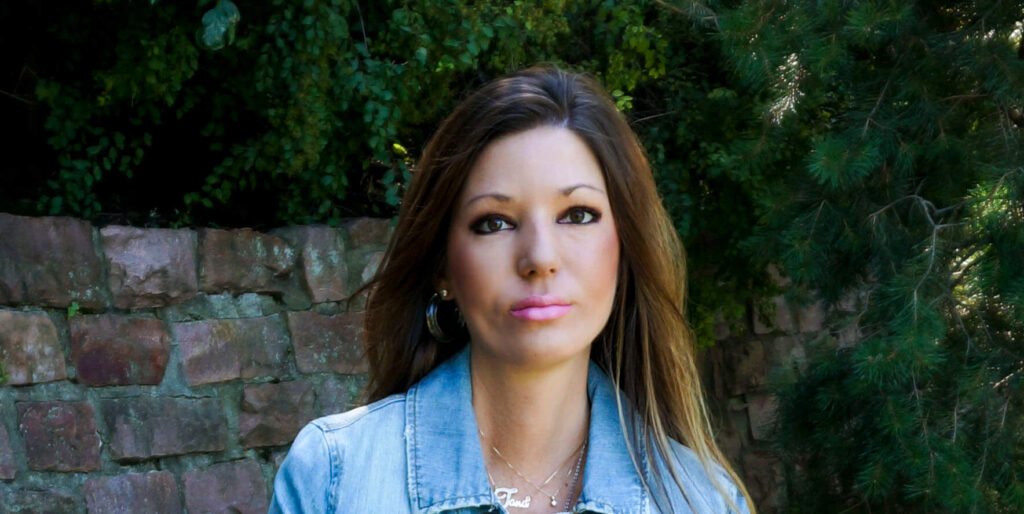
Quest for Success: Tana Zwart
By Rebecca Hume | Friday, March 25, 2022
5 Second Summary
Quest for Success explores the different paths that individuals with neuromuscular disease have taken to reach their potential and pursue dreams. This series spotlights individuals from our community and shares their journey to independence and accomplishment.
As the Muscular Dystrophy Association (MDA) continues our commitment to empowering people living with neuromuscular disease, we are excited to present our 2022 blog series: “Quest for Success”.
Success looks different to everyone and this monthly blog details the different paths that individuals with neuromuscular disease have taken to reach their potential and the steps they took to get where they are today. Each month we spotlight one individual from our community and share his or her journey to independence and accomplishment. We hope that these stories empower and inspire our readers to unlock the possibilities in their own lives…because the possibilities are limitless.
Media Manager Makes Her Own Path in the Big City
Tana Zwart has made an art of adapting to a changing job market while pursuing and achieving her goals. Using the tools and lessons that she gained growing up, throughout her education, and while finding her professional niche, the 37-year-old freelance media manager has certainly paved her own way.
Diagnosed with fascioscapulohumeral muscular dystrophy (FSHD) at 7 years old, Tana has never allowed her disability to deter her from pursuing her dreams. Instead, she recognizes and harnesses the power of perseverance and adaptation that her experience living with a neuromuscular disease has provided. “Having a neuromuscular disease, adapting is part of the fabric that is woven into us,” Tana says. She is quick to point out that goals, like people, are constantly evolving – an empowering understanding that has served her well as she navigates the detours and destinations on her quest for success.
Small town, big dreams
As a young girl, Tana was certain of two goals for her life: go to college and move to the “big city” of Sioux Falls. The small town of Edgerton, MN, where Tana grew up offered an environment that fostered her confidence and strong will. She shares that she was surrounded by a supportive family, friends, and community. Self-described as determined and stubborn about who she is and what she wants, she was not shy about creating a space where she was able to shine, grow, and succeed.
Tana started using a scooter in junior high school and transitioned to a power wheelchair during her senior year of high school. As one of the first students with a prominent physical disability to attend school in her local district, Tana and her family worked with the school to ensure that the facilities and curriculum were accessible. The school was eager to accommodate her needs by installing automatic doors and a mobile elevator for the school’s stage, modifying the bathroom, and assigning an adaptive PE teacher.
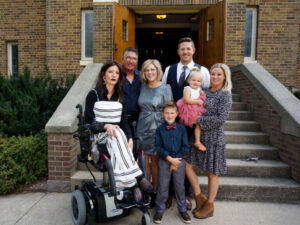
Tana with her family in Edgerton, MN.
Her adaptive PE teacher, Gaylynn Drooger, was incredibly motivated to ensure that Tana’s educational experience provided her the opportunity to cultivate her strengths. During elementary school, Mrs. Drooger met with Tana at recess every other day. As she moved into middle and high school, they met every time that Tana’s classmates had gym class. Working with Mrs. Drooger, Tana developed projects of independent study. She credits Mrs. Drooger as a true champion for her abilities, sharing that Mrs. Drooger recognized Tana’s will power and provided the support needed while also creating space for Tana to forge her own way.
Tana made it a point to get involved in as many extracurricular activities as she could. She recognized the value in experiencing and learning from as many programs as possible while also building an impressive repertoire of activities for her college applications. She joined band, choir, theater, and the Future Leaders of America leadership group. With a passion for writing (one that would impact the trajectory of her future), Tana wanted the opportunity to write for a school newspaper. Her high school did not have a newspaper, so Tana met with the principal and obtained permission to start a newspaper that she would both write for and serve as editor for four years.
Choosing a college campus for accessibility
Tana knew that she wanted to earn a college degree and pursue a career that involved writing. Choosing a college campus that would allow her to be independent away from her family was a priority. Knowing how crucial accessibility would be to her independence, Tana set her sights on a university with a college campus that is nationally renowned for its accessibility.
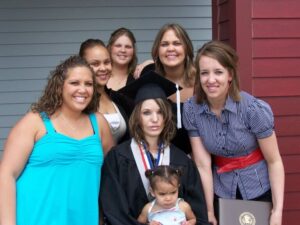
Tana with friends on graduation day.
She visited, applied to, and attended Southwest Minnesota State University (SMSU) in Marshall, MN. All of the academic buildings at SMSU are connected by internal “tunnels” so that students can easily navigate between buildings and classrooms without going outside – a definite perk for wheelchair users. Tana also worked with campus staff prior to attending to ensure that there were cut outs under the sink in her apartment and that the bathroom met her safety needs.
Tana made another key decision when she connected with a counselor at her local Vocational Rehabilitation Office during her senior year of high school. Every state offers occupational and vocational rehabilitation services, including assistance accessing and paying for higher education. Through this program, she was able to obtain funding for her tuition and books. She acquired student loans to cover remaining costs like room and board.
It’s not always a straight path
Tana earned a bachelor’s degree in literature and creative writing with a minor in graphic design. When she graduated in 2008, America was in the midst of an economic recession and print media was struggling to survive. Tana moved back home with her parents as she embarked on a journey of job seeking and working through various positions that would ultimately lead her to a position that felt like it belonged to her.
Her first job after graduating was a paid internship with the same Vocational Rehabilitation Office that had assisted her in obtaining her degree. She worked with clients to assist with resume development and collected resources for the workforce center. Honing her resume skills served her well as she began applying to other companies, newspapers, and print presses when her internship ended.
With the big dream of moving to Sioux Falls not quite a reality yet, Tana applied to jobs in the towns surrounding her parents’ home so that she could work and save money. She worked with the Medicaid program for people with disabilities to obtain funding to modify a vehicle that she could drive to her internship and interviews.
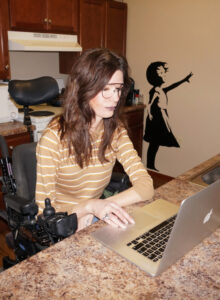
Tana working on her laptop.
Tana made the decision not to disclose her disability when applying for jobs and did not confirm accessibility before attending in-person interviews, a choice that she reflects came with some challenges. With luck, she did not encounter very many physical barriers. However, she maintains the belief that her disability and employers’ perception of her disability negatively impacted a number of hiring decisions.
Quick to point out that she didn’t experience blatant or outright negative behavior from interviewers, she shares there were multiple times that she felt that once the interviewer saw her physical disability, he or she merely went through the motions of the interview. But, she persevered.
Tana also enlisted the assistance of her vocational rehabilitation counselor on her job hunt. Her counselor helped her to connect with her first job at a print press. During the interview process for that role, her disability had been disclosed prior to meeting with her future employer – an employer who was smart to hire Tana and quick to offer any accommodations needed.
The printing press installed automatic doors so that Tana could enter and exit the building using a remote. They also made process accommodations. Certain physical aspects of her role were adjusted and/or modified so that another employee could provide a hands-on assist for tasks like loading and moving heavy printing materials throughout the workday.
Tana shares that the biggest challenge on her career path has been the process of finding a job that is the right fit. Her disease impacts her energy levels and requires her to limit the number of hours per week that she works. As her disease progressed along her journey, she also needed to transition to positions that allowed for flexibility and remote work.
Tana gained experience in various local positions as she continued to navigate working within her abilities, saving money, and waiting for her housing application in Sioux Falls to be approved.
Moving to the big city
To Tana, the pinnacle of success was moving to her own apartment and living independently in Sioux Falls. When she received notice that there was an opening in an affordable housing building, she jumped at the opportunity to make that dream a reality six years after graduating college. Accepting the apartment required her to quit her job and move to Sioux Falls before securing new employment in the city. Relying on money she had saved, her Social Security income, and a little help from family, Tana had to pound the pavement again and put herself out there to find employment.
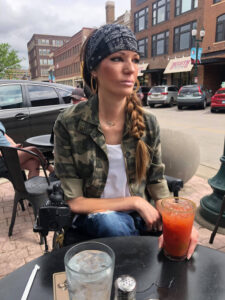
Tana enjoying life in Sioux Falls, SD.
She shares that moving to Sioux Falls was overwhelming but that she knew that she was capable of doing it herself with the resources available to her. Once there, she had to step outside of her comfort zone and network to make connections. Tana shares that networking was not her favorite thing to do but is now something that she enjoys and that has brought her many valuable connections in her community.
Tana started a work-incentive position (paid for by the Vocational Rehabilitation Office) at a local art non-profit that eventually turned into a permanent position. She split her working hours between her apartment and going to the studio once per week. Always improvising and adapting, Tana did her computer work on a table raised by paint cans to be the best height for her.
After the non-profit closed in 2019, Tana used the connections that she had made to begin working as a freelance media manager. Using the skillsets that she developed through her personal, educational, and professional experiences, Tana created a role that allows her to use her talents in a myriad of ways while working from home. She provides a variety of services to her clients based upon their needs, including social media, print media, administrative assistance, graphic design, and newsletters.
Making it all work
Tana feels that the most important aspect that has impacted her success is that she knows herself well. She places extreme value on being very aware of her own strengths and weaknesses, and being candid about what she wants and needs.
Tana lives alone and receives 12 hours per week of home health aide services through her state’s Medicaid program. She is responsible for hiring, scheduling, and managing her home health aides. Tana can slide transfer independently; home health aides assist with home support and some personal needs.
Tana works part-time and, as a freelancer, exercises autonomy over her schedule. Working part-time allows her to excel in a career that she is passionate about while adhering to a schedule that her body can tolerate. She also stays within the financial requirements to maintain her Medicaid services and housing program eligibility. Tana proactively met with a benefit analysis specialist at Vocational Rehabilitation prior to her move. The specialist aided in navigating resources and eligibility guidelines so that Tana had a strong understanding of her options.
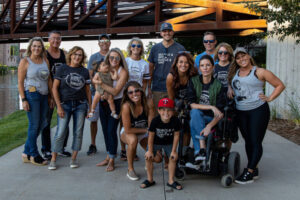
Tana with her MDA Muscle Walk Team.
Another resource that Tana credits with helping her pursue her goals is the Center for Independent Living (CIL). Most counties and/or states have CILS that offer a multitude of services to individuals with disabilities, often including housing and employment services. The CIL assisted Tana in finding accessible housing options and learning about different neighborhoods.
Since moving to the city, Tana has also gotten involved in advocacy and education for individuals with disabilities. She advises others to get involved with groups and causes that they are passionate about. Her other advice: you can do anything that you choose to do.
“You can do it. It may not look like the person next to you, but it’s your story and you write it. There are resources that can help you with the process. It can feel overwhelming; but stay focused on what you know that you want and take the little steps that will get you there,” Tana says. “Don’t get too caught up in what the world tells you about yourself. That can be disillusioning to a person with a disability. Know yourself well and don’t allow anyone else to tell you who you are.”
TAGS: College, Community, Education, Employment, Quest for Success, Year of Independence
TYPE: Blog Post
Disclaimer: No content on this site should ever be used as a substitute for direct medical advice from your doctor or other qualified clinician.



